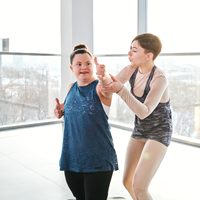AAC
Augmentative and Alternative Communication
AAD
Adaptive, Assistive Devices
Academy
A state-funded school in England that is directly funded by the department for Education, through the Education Funding Agency. Academies are self-governing and independent of local authority control.
Access to Work
An Access to Work grant from the department for Work and Pensions helps to pay for practical support for young people and adults who have a disability, health or mental health condition so they can start work, stay in work or set up their own business. It can pay for things like special equipment, fares to work if public transport is not practical, a coach or support worker or a communicator at a job interview.
Additionally Resourced Provision (ARP)
Additionally funded provision for particular types of special educational needs in mainstream schools, e.g for children with hearing impairment, physical disability, or visual impairment.
ADHD
Attention Deficit Hyperactivity Disorder
Advocate
Someone who can help ensure that a person is listened to and that his or her rights, concerns and needs are acted upon.
Age Weighted Pupil Unit (AWPU)
The AWPU is the amount of money that every maintained school receives for each pupil that is on the school roll, whether or not they have SEND. The value of the AWPU varies from one local authority to another and according to the age of the pupils. For primary age pupils the minimum is £2,000 per year. For pupils in Key Stages 3 and 4 the minimum is £3,000 per year
ALP
Alternative Learning Provision
Annual Review
The review of a child or young person’s education, health and care (EHC) plan EHC plan which the local authority must make as a minimum every 12 months.
Appointee
Someone who acts on another person’s behalf in all social security (benefits) matters.
ASD
Autistic Spectrum Disorder
Assessment
A formal process which involves collecting information from as many people as possible who have detailed knowledge about your child to help build a picture of their abilities, difficulties, behaviour and any special educational needs. An assessment may lead to an education, health and care (EHC) plan being issued.
Audiologist
A health professional who specialises in identifying and treating hearing disorders.
Audiometrician
A health professional who specialises in measuring hearing ability.
BOO
Basket of Opportunities
Blue Badge
The Blue Badge scheme helps people living with a disability park closer to their destination. You can apply for one from your local council.
BSL
British Sign Language
Carer
A carer is a person named by the local authority to look after a child who is in the care of social services.
Case conference
A formal meeting of professionals such as teachers or social workers to discuss a particular child.
Child and Adolescent Mental Health Service (CAMHS)
CAMHS promote the mental health and psychological wellbeing of children and young people and provide high quality, multidisciplinary mental health services to ensure effective assessment, treatment and support, for children, young people and their families.
Code of Practice
This is a national guide that goes to schools and local authorities from the Department for Education to outline the help they can give to children with special educational needs and disabilities (SEND). Schools, local authorities and health services must refer to the code of practice when they are involved with a child with SEND.
Community school
Maintained by Brent Council as the local authority.
Community special school
A school for children with special educational needs and disabilities, maintained by Brent Council.
CLDD
Complex Learning Difficulties and Disabilities
Connexions
Connexions services offer statutory careers information, advice and guidance services to 13-19 year olds (and up to age 25 for young people with special needs).
Curriculum
The curriculum is all of the learning opportunities that a school offers.
Challenging behaviour
Challenging behaviour is a term that is used to describe particularly ‘difficult’ or ‘problematic’ behaviour, which is experienced as challenging by parents and others who care for and support these individuals. Challenging behaviour is more common in individuals with learning disabilities than in those without; approximately ten percent of children with learning disabilities exhibit severely challenging behaviour. Those with physical, emotional, social and communication difficulties may also show behaviour that is worrying, difficult or challenging. A person's underlying medical and/or psychiatric condition, age, social experiences, adverse life events and a range of other factors can affect the type of behaviour.
Clinical Commissioning Group (CCG)
Clinical Commissioning groups (CCGS) are NHS organisations, which have been set up to commission healthcare services for their local communities
CSE
Child Sexual Exploitation
CVI
Cerebral Visual Impairment
CYP
Child or Young Person
DAF
Disability Access Fund
dB HL
Decibels Hearing Level
DfE
Department for Education
Differentiated Curriculum
A curriculum that is specially adapted to meet the special educational needs of individual children.
Direct Payment
A payment made directly to a parent or young person to purchase specific services. Under the Children and Families Act 2014 a Direct Payment may be made as part of a Personal Budget so that the parent or young person can buy certain services that are specified in their EHC plan.
Disagreement resolution
Local authorities must provide independent disagreement resolution to help parents and young people resolve disputes with local authorities, schools and other settings about SEND duties and provision. You can find more information on disagreement resolution in the SEND Code of Practice 11.6 to 11.10.
Early Education Settings
Pre-school education such as nursery classes and schools, day nurseries and playgroups.
EAL
English as an Additional Language
ECAT
Every Child a Talker
Educational Psychologist (EP)
An educational psychologist is employed by the local authority. They play an important role in assessing your child’s educational needs and will give advice to schools to help them meet those needs.
Education Funding Agency (EFA)
The EFA is the government agency that funds education for learners between the ages of 3 and 19, and those with learning difficulties and disabilities between the ages of 3 and 25.
The EFA allocates funds to local authorities, which then provide the funding for maintained schools. The EFA directly funds academies and free schools.
Education, Health and Care (EHC) Needs Assessment
Local authorities must carry out an EHC needs assessment if a child or young person may need an EHC plan. The assessment is a detailed look at the special educational needs that the child or young person has and what help he or she may need in order to learn. It is sometimes called a statutory assessment. You can find out more in the SEND Code of Practice sections 9.45 – 9.52.
Education, Health and Care (EHC) plan
An EHC plan describes the special educational needs that a child or young person has and the help that they will be given to meet them. It also includes the health and care provision that is needed. It is a legal document written by the local authority and is used for children and young people who have high support needs.
ELSA
Emotional Literacy Support Assistant
EYFS
Early years Foundation Stage
ELKLAN
Training by Speech and Language Therapists to Education Staff
First Tier Tribunal (SEND)
The First-tier Tribunal (Special Educational Needs and Disability) is a legal body. The Tribunal hears appeals from parents of children with SEN, and young people with SEN, about EHC needs assessments and EHC plans.
Foundation schools
Foundation schools are funded by the local authority, but the school governors have full responsibility for running the school and are responsible for making their own admission arrangements.
Free Schools
Free Schools are all-ability state-funded schools set up in response to what local people say they want and need in order to improve education for children in their community.
FRIENDS
An intervention programme underpinned by the principles of Cognitive Behaviour Therapy with the primary aim of reducing participant anxiety levels
Graduated Approach
The SEND Code of Practice says that schools should follow a graduated approach when providing SEN Support. This is based on a cycle of:
You can find out more about the graduated approach in the SEND code of Practice sections 6.44 to 6.56.
Gross Motor Skills
These are skills that develop through using the large muscles of the body in a coordinated and controlled way.
Movements of the whole arms, the legs and the trunk are all gross motor movements.
HI
Hearing Impairment or hearing loss occurs when a person loses part or all of their ability to hear. Other terms that are used to refer to hearing impairment are deaf and hard of hearing.
Inclusion
The principle of Inclusion is that children with special educational needs and disabilities have the right to be educated in mainstream schools alongside other children from their community, rather than being educated in special schools.
Independent Supporter
A person recruited by a voluntary or community sector organisation to help families going through an EHC needs assessment and the process of developing an EHC plan. This person is independent of the local authority and will receive training, including legal training, to enable him or her to provide this support.
Key Stages
The different stages of education that a child passes through:
Keyworker
Someone who provides children, young people and parents with a single point of contact to help make sure the support they receive is co-ordinated. A keyworker could be provided directly by a local authority or local health organisation, a school or college, or from a voluntary or private sector body.
Learning Disability
A Learning Disability is a reduced intellectual ability and difficulty with everyday activities, which affects someone for their whole life.
People with a learning disability tend to take longer to learn and may need support to develop new skills, understand complicated information and interact with other people.
The level of support someone needs depends on the individual. For example, someone with a mild learning disability may only need support with things like getting a job. However, someone with a severe or profound learning disability may need fulltime care and support with every aspect of their life – they may also have physical disabilities.
People with certain specific conditions can have a learning disability too. For example, people with Down’s syndrome and some people with autism have a learning disability. With the right medical, psychological, educational and social support most people with a learning disability can lead independent lives.
Learning Support Assistant (LSA)
A Learning Support Assistant (LSA), often referred to as a Teaching Assistant (TA), is provided to support teachers and pupils in the classroom. LSAs/TAs work in mainstream primary and secondary schools and special schools.
Local Authority
A Local Authority is an organisation that is officially responsible for all the public services and facilities in a particular area.
Local Offer
The Local Offer, published by every local authority, tells you what support is available for children and young people with special educational needs and/or disabilities, and their families. It includes information about education, health and care provision. It also gives information about training, employment and independent living for young people with special educational needs and/or disabilities.
LINS
Low Incidence Needs Service
LI
Language Impairment
Mainstream School
This is a school that provides education for all children, whether or not they have special educational needs or disabilities.
Mediation
Mediation is a type of disagreement resolution. Every local authority must provide independent mediation to help parents and young people resolve disputes with local authorities about:
Mediation must also be provided on the health and social care elements of an EHC plan. You can find more information on mediation in the SEND Code of Practice 11.13 to 11.38.
Mediation Advice
The purpose of Mediation Advice is to give information about what mediation involves. Parents or young people who wish to register an appeal with the First Tier Tribunal (SEND) must first seek mediation advice. This advice must be factual and unbiased. After mediation advice has been given the parent or young person can choose whether they wish to go to mediation. However, it is not necessary to seek mediation advice if the appeal is only about the name of the school, or college named on the child or young person’s EHC plan, the type of provision specified in the plan or the fact that no school or other institution is named. You can find more information on mediation advice in the SEND Code of Practice 11.21 to 11.25.
MSA
Midday Supervisory Assistant
MSI
Multi-Sensory Impairment
MAPPA
Multi-agency Public Protection Arrangements
NatSIP
National Sensory Impairment Programme
NPSLBA
National Programme for Specialist Leaders of Behaviour and Attendance
NVC
Non-Verbal Communication
Outcome
Section 9.66 of the SEND Code of Practice says: “An outcome can be defined as the benefit or difference made to an individual as a result of an intervention. It should be personal and not expressed from a service perspective; it should be something that those involved have control and influence over, and while it does not always have to be formal or accredited, it should be specific, measurable, achievable, realistic and time bound (SMART). When an outcome is focused on education or training, it will describe what the expected benefit will be to the individual as a result of the educational or training intervention provided.”
OT
Occupational Therapist
Parent Carer Forum
A parent carer forum is a representative local group of parents and carers of disabled children who work with local authorities, education, health and other providers to make sure the services they plan and deliver meet the needs of disabled children and families. They have been established in most local authority areas. For more information about Brent’s parent carer forum visit
Personal Budget
Personal Budgets are designed to help families have more control over their lives. It is an amount of money that has been identified by the local authority that can be used flexibly to support a child or young person with their education, health and/or care needs, as set out in their EHC plan. This does not usually include universal (mainstream) services that all children and young people can access, but may include individual support that needs to be put in place for a child or young person with SEND. The personal budget (along with the EHC plan) enables a child or young person and their family to exercise greater choice and control over how their education, health and care needs are met.
PECs
Picture Exchange Communication System
PSHE
Personal, Social, Health and Economic Education
QFT
Quality First Teaching
QTMSI
Qualified Teacher of the Multi-Sensory Impaired
QTVI
Qualified Teacher of Children and Young People with Vision Impairment
Reasonable Adjustments
Reasonable Adjustments are changes schools and other settings are required to make which could include: changes to physical features – for example, creating a ramp so that students can enter a classroom or providing extra support and aids (such as specialist teachers or equipment).
SENCo, or Special Educational Needs Co-ordinator
This is the school teacher who is responsible for assessing, planning and monitoring the progress of children with special educational needs and disabilities (SEND).
Schools Forum
Every local authority has a schools forum. It made up of representatives from schools and academies, and some representation from other bodies, such as nursery and 14-19 education providers. The role of the schools forum includes looking at the local formula used to fund schools and SEND provision.
SEN Tribunal (SENDIST)
An independent body that hears appeals against decisions made by the local authority on EHC plans.
SEND Code of Practice
This is the statutory guidance that supports Part 3 of the Children and Families Act 2014. It tells local authorities, early years settings, schools, colleges, heath and social care providers and others what they must and should do to identify, assess and provide for children and young people with SEND.
SEN Information Report
All schools must publish on their websites information about their policy and arrangements for supporting children with SEN. This must be kept up to date. The information that has to be included can be found in Section 6.79 of the SEND Code of Practice.
SEN Support
Every child with special educational needs should have SEN support. This means help that is additional to or different from the support given to most of the other children of the same age. The purpose of SEN support is to help children and young people achieve the outcomes or learning objectives set out for them by the school in conjunction with parents and pupils themselves. SEN Support replaces Early Years Action/Action Plus and School Action/Action Plus.
SEND Tribunal
See 'First Tier Tribunal (SEND)'
Severe Learning difficulties (SLD)
People with severe learning difficulties (SLD) tend to have significant restrictions in relation to their cognitive and/or intellectual capacities. These can co-exist with physical, sensory, social and / or emotional difficulties thus making it difficult for a pupil with SLD to follow the school curriculum without substantial support. As a result they will have difficulties with learning skills and applying them to differing context. Pupils with SLD may also use symbols, or signing such as Makaton to help with communication.
Short Breaks
Short Breaks are services that families with a disabled child or young person in Brent can access, some of which are subject to an assessment. They aim to:
Not all disabled children and their families will need the same level of support; some will require more than others because of the nature of their child’s disability and their individual circumstances.
Signposting
Sometimes a service that provides information, advice and support may be asked for help that it is not able to give directly.
When this happens the person seeking information, advice or support may signposted to other service providers. This means that they will be given information, including contact details, about other sources of help.
Special Educational Needs Co-ordinator (SENCO)
A SENCO is a qualified teacher in a school or maintained nursery school who has responsibility for co-ordinating SEND provision.
Special School
Special schools provide an education for children with a special educational need or disability. They are for children whose needs cannot be met within a mainstream setting, and whose parents or carers have agreed to, or requested, a special school placement.
SALT
A Speech and Language Therapist (SALT) person who helps children and young people who have language difficulties or speech problems.
SEAL
Social and Emotional Aspects of Learning
Silver Seal
An early intervention for children who need additional support in developing their social, emotional and behavioural skills
SEMH
Social, Emotional and Mental Health
SENAP
Special Educational Needs Advisory Panel
SEND
Special Educational Needs and Disabilities
Speech, Language and Communication Needs (SLCN)
Some children and young people find it difficult to listen, understand and communicate with others and may need support to develop these skills. SLCN is the umbrella term most commonly used to describe these difficulties. Children with SLCN may have difficulty with only one speech, language or communication skill, or with several. Children may have difficulties with listening and understanding or with talking or both. Each child also has a unique combination of strengths. This means that every child with SLCN is different.
SLD
Severe Learning Difficulties
SMART
Specific, measurable, Achievable, Relevant, Timebound (relating to targets)
SSE
Sign Supported English
Statement of Special Educational Needs
Under the Education Act 1996 local authorities issued Statements of Special Educational Needs for children whose needs could not be met through the provision normally made by schools. The Children and Families Act 2014 replaced Statements with EHC plans. Children and young people who already had a Statement have been transferred over to the new system.
Statutory Guidance
Statutory Guidance is guidance that local authorities and other local bodies have a legal duty to follow.
Supported Living
Supported Living is a type of residential support that helps vulnerable adults, including people with learning disabilities, live in the community.
Teaching Assistants (TAs)
Teaching Assistants work under the direction of teachers and are appointed to provide additional help in the classroom for a child or a group of children with identified special educational needs.
TAF
Team Around the Family
ToD
Teacher of the Deaf
Transition Plan
A plan drawn up at the annual review of an EHC plan when a child reaches Year 9 (13 or 14 years old). The plan sets out the support and provision that will be needed by the child as they make the transition into adult life.
UCAS
Universities and Colleges Admissions Service
Visual Impairment (VI)
Visual impairment is when a person has sight loss that cannot be corrected using glasses or contact lenses. There are two main categories of visual impairment:
VOCA
Voice Output Communication Aids
Voluntary Aided School
Most voluntary aided schools are Roman Catholic or Church of England schools, and usually give priority in their admissions criteria to pupils of their faith. The governing body employs the staff, sets the admissions criteria and contributes to building and maintenance costs. The school buildings and land are normally owned by a charitable foundation, often a religious organisation.
Voluntary Organisations
These are usually charities, which provide help and advice that is often linked to particular needs.
YOS
Youth Offending Service












